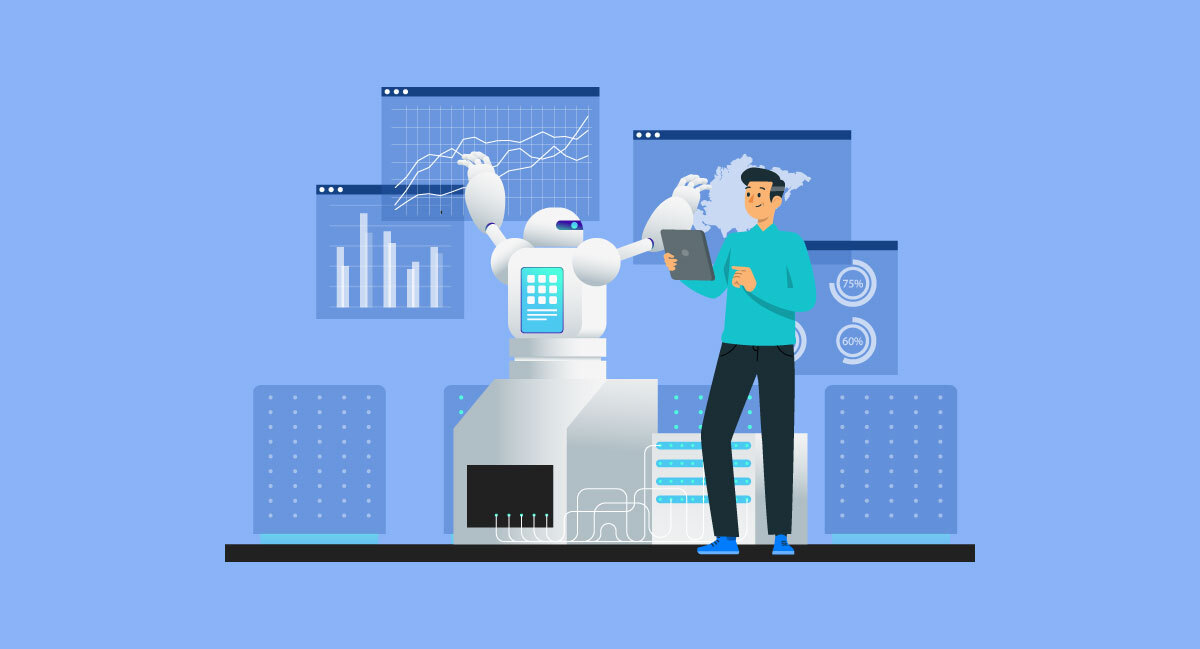The term Artificial Intelligence was coined for the first time way back in 1956 by John McCarthy. But, the business community at large, have witnessed its true potential in recent years with the invention of a large number of AI-based tools, including ChatGPT, Bard, Jasper, Pictory, and Fireflies, to name a few.
However, AI is not limited to these tools alone but has also made its way deep within advanced business software solutions like ERP and CRM, among others.
In this guide, we will explore how artificial intelligence in ERP is revolutionizing the business landscape and empowering organizations to better manage inventory, orders, and customer support.
What Is Artificial Intelligence in ERP?
As the term suggests, artificial intelligence in ERP combines the power of artificial intelligence software and ERP (Enterprise Resource Management) solutions.
In technical terms, AI in ERP refers to the integration of intelligent algorithms and technologies into ERP systems to automate business processes, decision-making, and data analysis.
Pro-tip
No matter which industry you belong to, one thing is certain: artificial intelligence is the future. To outpace your competitors, it’s crucial to invest in AI-powered ERP systems. By harnessing the potential of AI, you can drive innovation, optimize operations, and secure a leading position in your market.
Integrating AI in ERP not only reduces human effort but also automates and accelerates operations. Additionally, businesses can gain a better understanding of patterns and insights into their customers as well as their overall business.
Here are some key points that better explain artificial intelligence in ERP systems:
- AI in ERP leverages machine learning (ML), natural language processing (NLP), and other AI techniques to make ERP systems more intelligent and responsive.
- It enables the automation of repetitive tasks, such as data entry and inventory management, allowing humans to focus their time and efforts on more strategic activities.
- AI technology in ERP also helps analyze vast amounts of customer data, identify patterns and trends, and provide valuable insights for informed decision-making.
- Artificial intelligence in ERP systems enhances forecasting accuracy and optimizes supply chain management, leading to improved operational efficiency and customer satisfaction.
To sum up, AI in ERP empowers organizations to harness the power of intelligent automation, data analysis, and decision support. This will eventually help them drive productivity and efficiency.
Now the question is– How does AI work with an ERP solution? Let’s move on to the next section to find the answer.
How Does AI Work With an ERP?
It all starts with integration. AI algorithms are integrated into the ERP system to enable intelligent automation. This will automate repetitive, daily, and time-consuming tasks– allowing employees to focus on more strategic and value-added activities.
Moreover, AI algorithms can learn from historical data and make predictions or recommendations about various aspects, including inventory, supply chain, and customer expectations. This eventually improves decision-making and operational efficiency.
The following points better explain the working of AI with ERP:
- AI algorithms analyze large volumes of business data, such as sales numbers, customer purchasing behavior, and market trends. This helps businesses identify patterns and insights that inform decision-making.
- Natural Language Processing (NLP) allows AI-powered chatbots to better understand and respond to user queries, providing real-time support and assistance.
- Machine learning algorithms enable ERP systems to continuously learn and adapt based on user interactions and data inputs, ultimately improving accuracy and efficiency over time.
- AI algorithms can automate routine tasks like data entry, inventory management, and invoice processing, helping employees reduce human errors and save time.
- Lastly, AI-powered predictive analytics helps in forecasting demand, optimizing inventory levels, and improving supply chain management.
To sum up, by leveraging the power of AI in ERP systems, organizations can achieve higher productivity, accuracy, and agility, which ultimately leads to improved decision-making and business outcomes.
Now, let’s understand the benefits of AI in ERP systems in detail in the next section.
What Are the Benefits of Implementing AI in ERP Systems?
As discussed above, artificial intelligence in ERP systems has truly revolutionized the business world, enhancing the outputs of ERP systems manifold.
Let’s look at the key advantages of artificial intelligence in ERP solutions in detail:
1. Advanced Analytics
The first major benefit of AI in ERP is rich analytics. AI software empowers modern ERP systems to quickly and accurately analyze vast amounts of data. It identifies hidden patterns, predicts trends, and boosts business intelligence that help make data-driven decisions. Overall, with AI in ERP, you gain a competitive edge by staying one step ahead of the game.
2. Automated Efficiency
The next benefit of AI in ERP is that it helps automate mundane tasks. AI-based ERP automates repetitive activities such as data entry, report generation, inventory management, and more. This frees up valuable time and resources, enabling you to focus on strategic initiatives that drive business growth.
3. Enhanced Customer Experience
AI in ERP systems provides a comprehensive view of your customers. It consolidates data from various touchpoints, allowing you to deliver personalized experiences. From tailored product recommendations to timely support, you can better serve your customers, building long-lasting relationships.
4. Quick Problem Resolution
AI is a master problem-solver. By leveraging machine learning algorithms, AI in ERP systems identifies unexpected patterns, detects inefficient processes, and alerts you to issues in real-time. It even provides intelligent suggestions on how to resolve problems efficiently, minimizing disruptions to your business operations.
5. Adaptability and Scalability

ERP systems enhanced with AI have the ability to learn and adapt easily. As your business evolves, AI algorithms continuously optimize processes, fine-tuning recommendations, and improving accuracy. This means that whether you are expanding into new markets or revising your customer support approaches, AI-based ERP systems grow alongside your business.
6. Cost Optimization
Lastly, AI in ERP software solutions helps optimize costs across your organization. By analyzing historical data and sales patterns, it streamlines inventory management and reduces wastage. These cost-saving measures ultimately contribute to higher profitability and improved financial performance.
To encapsulate, AI and ERP together form a powerful synergy that empowers your business from top to bottom.
How is Artificial Intelligence in ERP Transforming Business?
Although it has become clear by now that AI in ERP is a perfect combination that every modern business should consider, let’s look at some key factors that explain how artificial intelligence in ERP systems is transforming businesses:
1. Enhancing Efficiency and Automation in Business Processes
Artificial intelligence in ERP empowers businesses to automate repetitive and time-consuming tasks, such as data entry, inventory management, and order processing. By automating these processes, organizations can free up valuable human resources, reduce errors, and achieve higher operational efficiency.
2. Intelligent Decision Making with AI-enabled ERP Systems

AI-based ERP systems utilize advanced analytics and machine learning algorithms to provide intelligent insights and recommendations for decision-making. By analyzing vast datasets and identifying patterns, these systems enable companies to make data-driven business decisions, optimize workflows, and respond quickly to changing market dynamics.
3. Personalized User Experiences and Improved Customer Engagement
AI-enhanced ERP systems enable personalized user experiences by tailoring interfaces, workflows, and recommendations to individual users’ preferences and needs. This customization enhances user satisfaction and productivity while also facilitating improved customer engagement through personalized interactions.
4. Streamlining Operations and Optimizing Resource Allocation
AI in ERP systems optimizes resource allocation by analyzing data on workforce capacity, production schedules, and customer demands. This enables businesses to allocate resources effectively, streamline operations, minimize wastage, and improve overall productivity.
5. Mitigating Risks and Enhancing Security with AI-driven ERP
Artificial intelligence strengthens ERP systems’ security by identifying anomalies, detecting potential threats, and preventing cyberattacks. AI algorithms can continuously monitor system activities and proactively respond to security breaches, ensuring data integrity and protecting sensitive information.
6. Driving Innovation and Business Growth with AI-enhanced ERP
AI in ERP fosters innovation by enabling businesses to extract actionable insights from vast datasets, identify emerging market trends, and uncover new growth opportunities. By leveraging AI-driven analytics, organizations can stay ahead of the competition, drive innovation, and achieve sustainable business growth.
These benefits of AI in ERP might sound exciting to you; however, implementing AI in ERP is not an easy job and is full of challenges. Let’s look at the major challenges of implementing artificial intelligence in ERP.
Challenges of Implementing AI in ERP
Here are some of the major hurdles you may face when incorporating AI into their ERP systems.
Challenge #1: Data Integration and Quality
As we learned, AI relies on large volumes of high-quality data to deliver accurate insights. However, integrating AI with ERP systems requires careful data mapping and synchronization. Ensuring data accuracy and consistency across different ERP modules can be a complex task.
Challenge #2: Skill Gap and Training
Leveraging AI in ERP requires a skilled workforce capable of understanding and managing AI technologies. Training employees to work with AI-based ERP systems as well as interpreting AI-generated insights can be a major challenge.
Challenge #3: System Complexity and Integration
Integrating AI into existing ERP systems can also be challenging due to the complexity of both AI and ERP technologies. Compatibility issues and system architecture changes during implementation can pose significant obstacles.
Challenge #4: Cost and Return on Investment (ROI)
Implementing artificial intelligence in ERP systems also involves investments in AI infrastructure, tools, and skilled resources. You will need to carefully evaluate your budget, the potential ROI and justify the costs associated with AI integration.
Challenge #5: Employee Resistance & User Adoption

Introducing AI-based ERP systems requires organizational change. Employees may need to adapt to new workflows, attitude, and decision-making processes. Overcoming resistance to change or ensuring maximum user adoption are key challenges.
Conclusion
There is no doubt that AI is the future as it clearly has an edge over human intelligence. Integrating it into ERP helps businesses in more than one way, including automating repetitive and mundane tasks, providing rich insights into massive data, and supercharging efficiency, among others. However, as discussed, it has its own set of challenges that must be considered and addressed to achieve maximum results.
Frequently Asked Questions

Paras Kela is a highly skilled SaaS content writer with over 7 years of experience in the IT field. His expertise lies in simplifying complex technical concepts for easy comprehension. With a portfolio of over 100 high-quality blogs covering various SaaS topics, Paras’s writing style is engaging, informative, and SEO-friendly, ensuring maximum effectiveness. He continuously updates his skills and knowledge to stay current with industry trends, making his writing relevant and reliable.
[adsanity_group align=’alignnone’ num_ads=1 num_columns=1 group_ids=’15192′]
Need Any Technology Assistance? Call Pursho @ 0731-6725516




